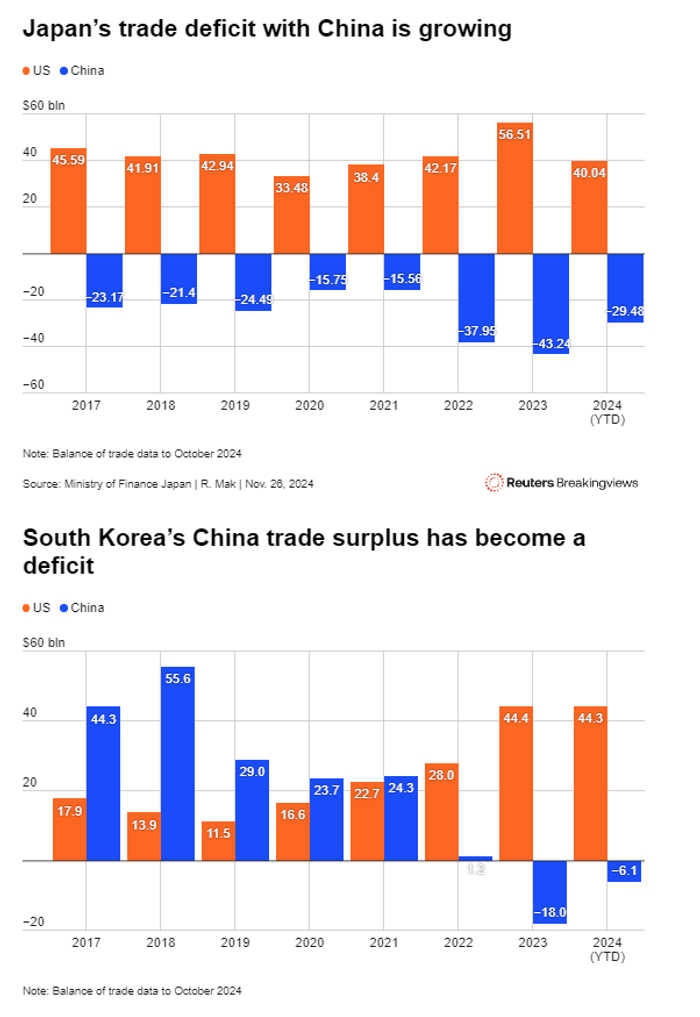Published 13:54 IST, December 23rd 2024
US-China Tech War Will Hold Asian Allies Hostage
Beijing has been quietly laying the groundwork to weaponise its near monopoly on rare earths and critical minerals.
- Technology
- 4 min read

Gloves off. China will turn Washington’s technology weapons on its Asian neighbours in 2025. U.S. curbs on imports of semiconductors and other goods have hobbled advances in artificial intelligence in the world’s second-largest economy. The People’s Republic is starting to retaliate. Its leverage over corporate giants in Japan and South Korea makes them prime hostage targets.
In 2022, outgoing U.S. President Joe Biden introduced sweeping measures to block China’s access to cutting-edge chips and chipmaking technology. Since then, Washington has expanded the controls to cover a broader array of equipment and materials, including machines and tools made by Dutch giant ASML and Japan’s Tokyo Electron. In December, the Biden administration added more than 100 Chinese entities to its trade restriction list as part of its new package of controls.
The tightening restrictions have prompted Beijing to respond. In mid-2023, the government started requiring export licences for gallium, germanium, graphite and antimony – materials vital for making batteries, semiconductors, fibre optics and weapons. But a closer look at the trade flows did not show Chinese authorities systematically denied export licences, according to Cory Combs, a researcher from analysis firm Trivium China. That is about to change. In response to Washington’s latest controls, the Chinese government announced an outright ban on some of these materials being exported to the United States – its strongest tit-for-tat measure yet.
Further retaliation is likely as China falls further behind in AI. Local technology giants like Tencent and Baidu are running down their stockpiles of now-banned Nvidia chips and will have no choice but to turn to domestic alternatives to train their AI models. But the latest chip designed by local semiconductor darling Huawei, the country’s best answer to Nvidia’s coveted graphics processing units, is three generations behind the $3.3 trillion U.S. market leader, Bloomberg reported.
Against this backdrop, Beijing has been quietly laying the groundwork to weaponise its near monopoly on rare earths and critical minerals. In June, the government unveiled a raft of regulations aimed at protecting the country’s rare earth supplies; these rules cover mining, smelting and trading and establish state ownership of rare earths resources.
The latest export ban from China’s Ministry of Commerce follows an overhaul of existing rules. Whereas past curbs on gallium and germanium have been piecemeal, the new unified regime grants stricter government oversight on technologies and goods that can be used for civilian and military purposes. Businesses selling certain types of graphite, used in electric-vehicle batteries, must first disclose details about their overseas customers and the end use of the materials. Taking a page of out Washington’s sanctions playbook, China will also have a “control list” of foreign companies which are subject to extra restrictions and licences.
Yet targeting American firms like Micron Technology or Tesla at a time when the struggling Chinese economy needs trading partners, foreign investment and tech know-how could be self-defeating. In 2023, Chinese infrastructure companies were banned from buying certain memory chips from Micron. Even so, a year later, the Idaho-based firm’s ties to China have strengthened, with Chief Executive Sanjay Mehrotra meeting with the Minister of Commerce and breaking ground on a new factory in the country in 2024. Meanwhile, carmaker Tesla’s China sales are on track to grow by 14% to $23 billion in 2025, per Visible Alpha forecasts.
Instead, Beijing holds far more leverage over U.S. allies in Asia. A Japanese government white paper found that the country relies on China for nearly a third of its imports, compared to 13% for the United States. These goods range from machinery to organic chemicals to electrical equipment. And despite official efforts to diversify supply chains away from China, a separate study found South Korea’s dependence on the People’s Republic for five out of six raw materials necessary for chipmaking actually increased in 2023.

That puts Tokyo and Seoul’s corporate champions in a vulnerable position. Toyota has privately voiced concerns that China would cut off the $220 billion carmaker’s access to critical minerals, Bloomberg reported in September, citing sources. In addition to supply chains, it also has factories on the mainland. South Korea’s memory chip giants SK Hynix and Samsung Electronics, as well as battery specialists LG Chem and SK On, are in a similar boat.
Just a threat of export controls might be sufficient for those countries to think twice about joining the tech war against China. Beijing has plenty of weapons to fight back. In 2025 it will train them on U.S. allies.
Updated 13:54 IST, December 23rd 2024